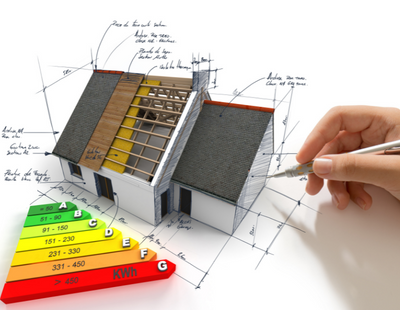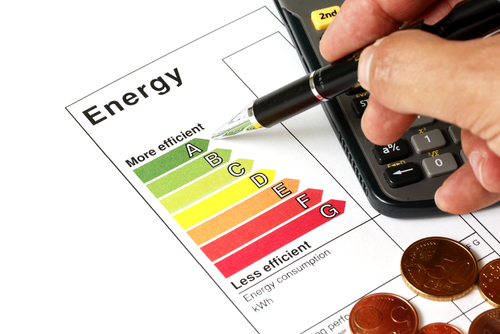
Prime Minister Rishi Sunak has thrown his weight behind Housing Secretary Michael Gove’s proposals to delay deadlines for EPC improvements in the private rental sector.
In what appears to have been a Whitehall briefing to the Financial Times, unnamed government officials is quoted as saying the entire system of energy performance certificates required “fundamental reform”.
The officials told the FT that the Prime Minister and the government supported delaying a deadline for landlords in England and Wales to meet mandatory efficiency standards beyond the proposed date of April 2025.
And they said they EPC system had been originally designed “as an informational tool to meet the requirement of EU membership” and therefore was subject to likely reform now that Britain was ousted the EU.
Earlier this week Sunak - building on the surprise Tory victory in the Uxbridge by-election - said he did not wish to “hassle” voters or “add to” household bills at a time of high inflation by adding costs linked to the environmental agenda. The UK is committed to hitting a net zero carbon emissions target by 2050.
On Tuesday ministers announced that they were delaying a new £1.7 billion-a-year UK recycling scheme until after the 2024 General Election following warnings that it would increase already high food and drink prices.
Some 48 hours earlier - in a Sunday Telegraph interview - Gove gave strong hints that the EPC rental timetable would change.
The paper said: “Mr Gove admitted that in his own department the government was ‘asking too much too quickly’ of landlords, who will be banned from renting out their homes unless they pay for green measures such as insulation and heat pumps to meet a new minimum energy efficiency threshold by 2028. Citing existing financial pressures on landlords [Gove] added: ‘I think we should relax the pace.’"
In recent days Rightmove revealed that 16 per cent of homes listed on the portal had previously been let privately, with concerns over stricter Energy Performance Certificates now the main reason for landlords selling.
Back in February research showed that Energy Performance Certificates were inaccurate at best, useless at worst, and easily rigged.
A Sunday Times report revealed the results of sophisticated and highly detailed research by a firm called CarbonLaces. The firm claimed EPCs overestimate energy use by up to 344 per cent yet they remained a key part of current and expected legislation affecting landlords and other home owners.
CarbonLaces compared the EPCs of more than 17,000 homes with their actual use, as logged by smart meters every half hour for at least 300 days, to calculate their energy bills.
The Sunday Times reported: “The average metered gas and electricity use for all the properties studied was 125kWh per square metre a year — 91 per cent lower than what their EPCs claim (239kWh/m2/yr).
“The lower the EPC rating, the bigger the overestimation. For properties with the worst rating of G, EPCs estimate they use 656kWh/m2/yr. Yet their smart meters show they use only 151kWh/m2/yr — a 344 per cent gap.”
This inaccuracy is “quite staggering” said Madhuban Kumar, the founder of CarbonLaces.













%20-%20IMAGE%20Client%20Accounting%20%E2%80%93%20what%20are%20your%20options.jpg)

.png)

%20(002).png)


.jpg)







Join the conversation
Jump to latest comment and add your reply
What do you say Martin Gibbons? We’ve all been saying that the EPC rating system is crap and you’ve been defending it : “EPC’s inaccurate at best, useless at worst, and easily rigged.”
So much for upgrading properties to a rating standard that is probably going to change anyway!
Be very careful what you wish for, Peter. The Government made the whole EPC national database digital in 2020. This means that at a press of a button they can change the 'running cost/fuel poverty' domestic EPC measurement over to a 'CO2 pollution' measurement. Commercial landlords, like me, have had the 'CO2 pollution' measurement for our EPCs for over 15 years and its now really driving out gas burning boilers from the UK's 1 million commercial rental units. But the transition to low carbon and low running cost housing will continue at pace because UK banks are quickly choking off mortgages and other forms of lending to energy wasteful, high CO2 emission property 'assets'. This has been going on in the commercial property banking sector for years.
But please keep burying your head in the sand like landlords in the past did who - refused to install drainage, refused to install bathrooms, refused to install electricity, kept building with asbestos, refused fire compartmentation etc etc. Those guys ended up with some great long-term assets.. NOT.
I can assure you that I am not wishing for anything, apart from perhaps the whole thing being dropped which is unlikely. All I am saying is that the system isn’t fit for purpose and if you are spending a fortune on measures to satisfy the present requirements, you may find that those measures no longer satisfy future requirements.
I am not burying my head in the sand, I have installed condenser boilers in the houses with a gas supply, (which of course may fail to meet future standards), loft insulation, modern double glazing and low energy lighting. These are effective, cost efficient measures. What I am reluctant to do is spend a fortune on things like external wall insulation on a Victorian house which will probably lead to damp problems when we don’t yet know what the EPC standard may stipulate. So I think I will wait until we know more. While I am aware that some lenders offer slightly better rates to finance grade C and above properties, I really can’t imagine houses with a lower than C rating becoming unmortgagable. This would paralyse the property market.
I wish there was an unlike button on here.
The EPC is a blunt tool and is still disregarded by many. In my experience, as an energy assessor of both domestic and commercial property, those that run them down, usually chose not to understand them or can't be bothered. "If you can't measure it, you can't manage it". The domestic EPC simply records what is at the property, on the day of the visit and the system makes recommendations/suggestions as to what might be done, to improve the energy efficiency. Lighting in homes makes very little difference to the Rating, because most of us turn off lights, in rooms we are not occupying. With commercial buildings, lighting makes a huge difference to the Rating, because in shops, factories etc, the lights are always on.
David, I think that a lot of the criticism of EPC’s stems from frustration of trying to upgrade properties to meet the criteria and failing only to find that the house next door is done to a lower standard but achieves a higher score.
The EPC reform needed is crystal clear. The certificate should display 2 x EPC Grade graphs. The normal 'running cost/fuel poverty' EPC measurement PLUS the 'CO2 pollution/Net Zero' EPC measurement. Both Grades should appear side-by-side at the top of the certificate. This can be actioned at the press of a button. The CO2 Grade measurement is already stated on the certificate but its buried under the 'Impact to the Environment' heading
Next - what should be the next step for the very successful Minimum Energy Efficiency Standard (MEES). This has already ensured that no new lettings of the most energy wasteful houses and flats have taken place since 2018. It seems prudent that we raise the Minimum Standard to Grade D (for both running cost and CO2 EPC measurements) for all new lettings and continuing lettings from April 2028. One simple step at a time. Let's forget Grade C by 2025 - that's unachievable because the Government has left it too late to confirm the deadline. But EPC Grade D by 2028 is totally doable. Of course, the average EPC Grade of a UK home is already Grade D.
That sounds like a more reasonable approach although it would only delay the the impracticality of raising Victorian houses to a C rating.
Maybe I’m being a bit thick but the running costs and CO2 emissions seem to be working against each other. I’ve had EPC assessor recommendations to upgrade the heating to a condenser gas boiler but this would reduce the CO2/ Net Zero rating?
Not a thick question at all, Peter.
If you are just focussed on 'running cost' then, at the moment, it is still cheaper to burn gas in a combi boiler to power wet radiator central heating compared to heating a house with 'dumb' electric panel wall heaters that use expensive day-time electricity. With these old fashioned electric panel heaters you put in 1kW of expensive day-time electricity but only get out 1kW of heat energy. Over time Governments will tax the burning of gas just as they have taxed the burning of petrol and diesel for many years.
But if you want to reduce 'CO2 pollution' then the only game in town is to use electricity to do the heating because the UK's national grid electricity is now becoming very green after successive Governments building massive off-shore wind farms for the last 23 years and with 1,000s more planned to be built in the North Sea.
So the answer for UK housing is to insulate houses and flats very well (that's what Social Registered Landlords have been doing for years) and then transition over to 'intelligent' electric heating which means the clever Dimplex Quantum night storage heaters (using the much cheaper night-time tariff) or air-to-air source heat pumps (like the simple Panasonic units) with wall mounted cassettes inside in the living room and bedrooms linked to an electric condenser outside.
Remember, the simple and highly effective Minimum Energy Efficiency Standard (MEES) Regs will always have the Exemption Register for buildings that will cost too much to improve. If you self-exempt yourself from MEES you can still rent out your property. The Regs have had this sensible 'pressure release valve' built-in since the Tories introduced MEES in 2015.
Gibbons
I disagree with practically everything you write. CO2 is an important fertilizer and fundamental to human life. The cost of upgrading the electricty grid for so called green energy or renewables is staggeringly expensive. There is no such thing as either green energy or renewables. Electric wall heaters have losses and so does the distribution system..it's called l squared R. When the conservatives privatised the energy industry it has turned into a looting exercise.
Gibbons can you tell us who and what you are ? Or is it just a government bot ?
Please login to comment